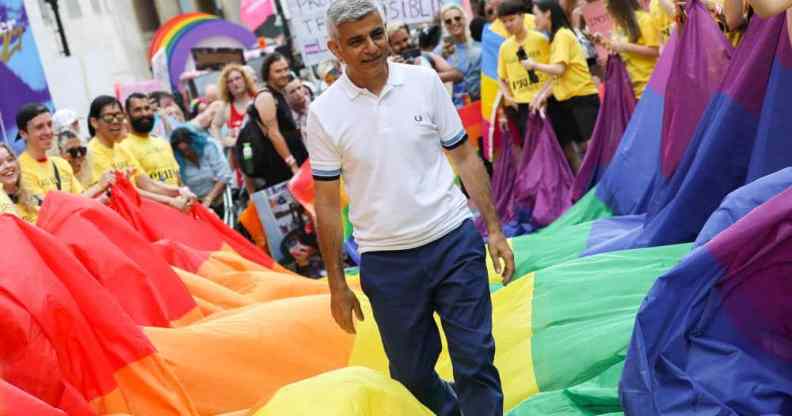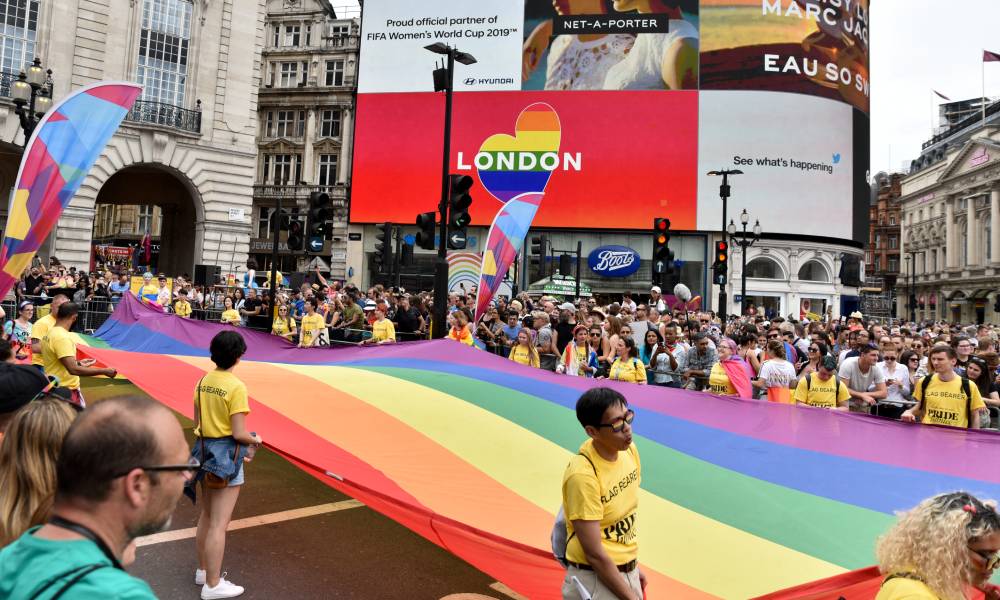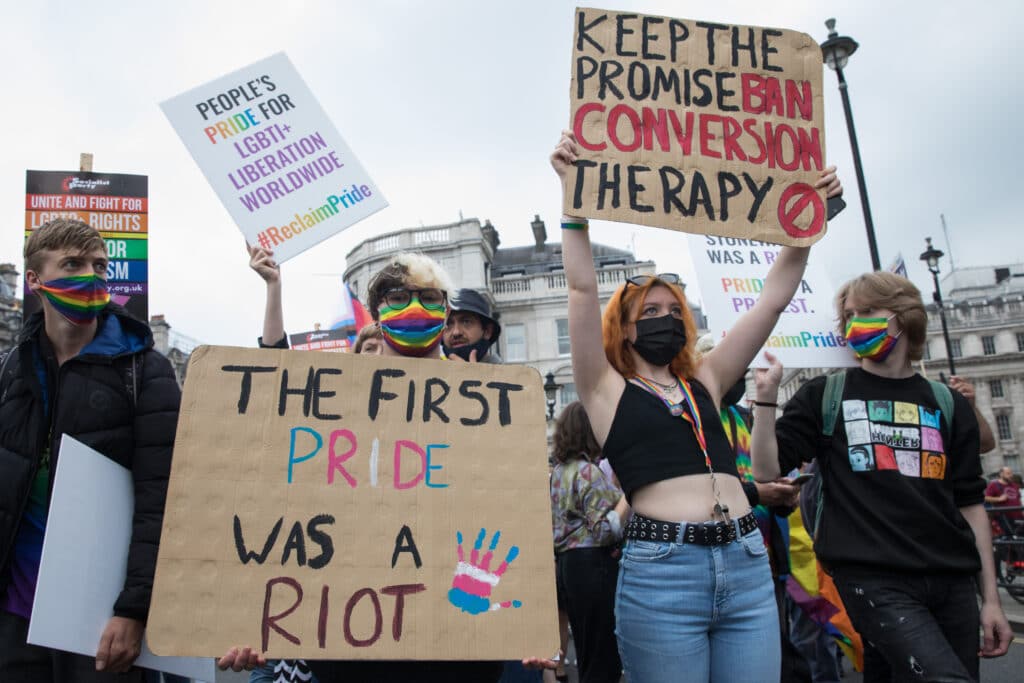Sadiq Khan urged to remove Pride in London’s entire board and start inquiry into racism claims

London Mayor Sadiq Khan during the parade at Pride in London 2019. (Tristan Fewings/Getty for Pride in London)
LGBT+ leaders have called on Sadiq Khan to reform Pride in London following accusations of racism and bullying, ahead of its 2022 return.
The non-profit has been bombarded with demands for new leadership after its formerly most senior Black official Rhammel Afflick quit in March over a culture of racism steeped into the top of Pride in London. This prompted a wave of resignations – including at least 20 volunteers and its community advisory board – shortly after.
Pride in London’s five most senior members also stepped down following the damning accusations. This included former co-chairs Alison Camps and Michael Salter-Church, a former adviser to the Conservative Party who founded the group in 2012.
However, activists are now calling on Khan to make significant reforms to Pride in London ahead of its 50th anniversary in 2022.
In an open letter dated 18 October, they urged the mayor of London’s office to “act now to demand the removal of the current board of directors” of Pride in London and replace them with a new team “representative of, and accountable to, the whole LGBTIQ community”.

Huge crowds gathered for Pride in London in 2019. (Dinendra Haria/ SOPA Images/LightRocket/ Getty)
Peter Tatchell, who helped organise the UK’s first Pride march in 1972 and has marched in every London Pride since, was among the letter’s signatories.
He urged Khan to “take action” and reform Pride in London as the organisation “has lost the trust and confidence of much of the LGBTIQ community”.
“Our nine demands are a bid to the fix the problems with Pride in London,” he wrote. “They are a compilation of concerns expressed by a wide cross-section of the LGBTIQ community.”
Tatchell continued: “We do not claim to have all the answers. We see this letter as a catalyst for change.
“I hope it will generate a much-needed debate within our community about who runs Pride, how it is run and Pride’s future character and direction. We welcome others contributing ideas.”
The letter’s nine demands range from an independent inquiry into the allegations of racism and bullying to putting LGBT+ rights back at the “front and centre in the promotion of Pride in London”.
It noted that Pride in London commissioned an investigation by venerable LGBT+ campaigner Lisa Power, but has refused to publish her full report.
“This gives the impression of a cover-up. Our community has a right to know.”
It outlined concerns that the annual Pride march has become too commercialised with “corporate and commercial interests having undue influence” over the event. The letter said companies were “eager to exploit the LGBTI+ community as consumers” by advertising with Pride in London.
“Pride should be about human rights, not profits,” the letter declared.
The letter’s signatories include current and former organisations of Pride in London and its community advisory board.

The Pride in London 2019 Parade passes through Piccadilly Circus. (Photo by Matthew Chattle/Barcroft Media/Barcroft Media via Getty Images)
A spokesperson for the mayor of London told the Evening Standard that the city will “always be a beacon of inclusiveness, acceptance and diversity”. They added the contributions of London’s “vibrant and diverse LGBTQ+ community are vital in shaping successful Pride in London events”.
The spokesperson added: “As we look ahead to welcoming the 50th-anniversary celebration of Pride in London next year, we are fully committed to supporting the community to deliver a safe and inclusive event.”
In August, Pride in London cancelled its annual parade for the second year in a row citing COVID-19 restrictions. Last year’s march was also scrapped due to the pandemic.
Despite this setback, several LGBT+ community members and allies celebrated the first-ever Reclaim Pride march, which took the place of Pride in London. The march, which took place in July, passed by major London Landmarks including Parliament Square and 10 Downing Street.
Reclaim Pride was billed as a replacement to the “traditional Pride in London parade” that put “LGBT+ human rights back” at the forefront.

Protesters holding placards at the first-ever Reclaim Pride march on 24 July, 2021, in London. (In Pictures via Getty/ Mark Kerrison)
In response to the new open letter, Pride in London said it’s regularly engaging with the queer community to deliver next year’s event while “prioritising the needs of marginalised groups and individuals within the LGBTQ+ community”.
A spokesperson told the Independent: “We are on a journey, like many organisations, and whilst we have very recently made some sizable modifications after consultation with our team, including a leadership team made up of 50 per cent minority and ethnic individuals, we will not stop building visibility, unity and equality into the heart of everything we do.”
However, Afflick told the outlet that Pride in London has a long road ahead to “regain the trust of LGBT+ communities” which starts with “engaging with other community organisers and wider communities transparently”.
He added it would also require “taking action on the issues that have surfaced repeatedly”.
“It cannot be right that Black volunteers and Black communities have repeatedly highlighted issues of racism over the last four years without a meaningful response,” Afflick said.
“It seems as though pride organisers have decided to move on without properly addressing the issues that came to light earlier this year.”

